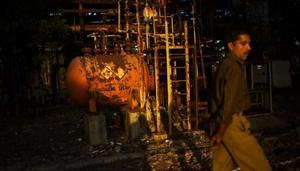Outrage in India over Bhopal verdict
The 1984 toxic gas leak in the Union Carbide pesticide plant in Bhopal, India claimed between 15,000 and 20,000 lives; in addition to thousands of dead, the toxic gas left hundreds of thousands either disabled or grappling with chronic illnesses ranging from kidney and liver damage, to cancer and birth defects; court in India sentences seven of the plant managers to two years in jail and a fine of $2,200 each; Union Carbide India was fined $10,500; Warren Anderson, a top Union Carbide executive and named defendant, lives in the United States and has not answered court summons from India

Policeman patrolling the deserted Union Carbide facility in Bhopal, India // Source: life.com
Around midnight on the night of 2-3 December 1984, there was a leak of methyl isocyanate (MIC) gas and other toxins from a Union Carbide India Limited (UCIL) pesticide plant in Bhopal, Madhya Pradesh, resulting in the exposure of more than 500,000 people. UCIL was the Indian subsidiary of the U.S. company Union Carbide Corporation (UCC), itself now a subsidiary of Dow Chemical Company.
Estimates vary on the accident’s death toll. The official immediate death toll was 2,259 and the government of Madhya Pradesh has confirmed a total of 3,787 deaths related to the gas release. Other government agencies estimate 15,000 deaths. Others estimate that 8,000 died within the first weeks and that another 8,000 have since died from gas-related diseases.
In addition to thousands of dead, the toxic gas leak left hundreds of thousands either disabled or grappling with chronic illnesses ranging from kidney and liver damage, to cancer and birth defects.
More than twenty-five years after the gas leak, 390 tons of toxic chemicals abandoned at the UCIL plant continue to leak and pollute the groundwater in the region and affect thousands of Bhopal residents who depend on it, though there is some dispute as to whether the chemicals still stored at the site pose a continuing health hazard.
The Times of India reports that seven UCIL officials, convicted in the 26-year-old Bhopal gas tragedy case, have been granted bail and released on submission of a surety of Rs 25,000 ($530.00) by a trial court in Bhopal.
Earlier on Monday, eight accused, one of whom is deceased, were sentenced to two years in prison and $2,200 each for causing death due to negligence.
A Rs 500,000 ($10,500.00) fine has been imposed on UCIL.
The court said its ruling that the “very worst” of American and Indian cultures caused the Bhopal gas tragedy. Chief Judicial Magistrate Mohan P Tiwari said Union Carbide, which owned the leaking plant, used a third world country to escape the strict safety standards it faced in America
“The tragedy was caused by the synergy of the very worst of American and Indian cultures. An American corporation cynically used a third world country to escape from the increasingly strict safety standards imposed at home,” said Tiwari in his judgment. “Safety procedures were minimal and neither the American owners or the local management seemed to regard them as necessary.”
There was no disaster plan that could be set into action when the deadly methyl isocyanate gas started leaking from the plant. “Prompt actions by the local authorities could have saved many, if not most of the victims,” said Tiwari, adding the immediate response was marked by callous indifference.
The judge said Union Carbide should have taken precautions when it was dealing with such lethal chemicals. “It was the burden of local government also to play its supervisory and regulatory role with the utmost sincerity. However, both UCIL and government utterly failed in doing so.”
In 1989 Union Carbide paid a settlement of $470 million to the Indian government. The company was later bought by Dow Chemical, which said its legal liabilities ended with that settlement.
Disabled survivors say they have only received a small amount of the settlement money, and that the money they have received is not enough to pay medical bills and replace lost income.
VOA reports that Indian officials say they will appeal for harsher sentences for the seven former managers. The chief of India’s central Madhya Pradesh state accused the federal government of failing to take “any serious steps” to get justice for victims of the leak.
Shivraj Singh Chouhan said he has created a panel of legal experts in order to appeal the case to India’s High Court.
The verdicts sparked outraged among relatives of the victims, who called the ruling “too little, too late.”
On Tuesday, Indian Law Minister Veerappa Moily said the government is still investigating the former top executive at Union Carbide, calling Warren Anderson a proclaimed offender. Anderson was arrested after the gas leak but then left India. He now lives in the United States and has not answered court summons from India.
